#schlegel family
Text
“HOWARDS END” (2017) Review
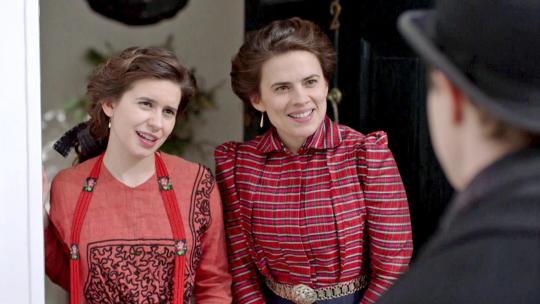
"HOWARDS END" (2017) Review
If there is one production company associated with the works of E.M. Forster it is Merchant-Ivory, the creation of producer Ishmail Merchant and director-producer James Ivory. I find this odd, considering that Merchant-Ivory have only adapted three of Forster's novels. One of those novels is "Howards End", published in 1910. There have been at least three on-screen adaptations of the latter - a 1970 BBC movie, Merchant-Ivory's 1992 Oscar winning film and the ITV's 2017 miniseries. This particular article happens to be about the latter.
"HOWARDS END" is basically an exploration of social and class divisions in Edwardian Great Britain, through the viewpoints of three families - the intellectual and idealistic Schlegels, the Wilcoxes; who are wealthy capitalists; and the working-class Basts. Sisters Margaret and Helen Schlegel become acquainted with the Wilcox family during a trip to Germany. When Helen, the younger Schlegel sister, visits the Wilcoxes at their country house, Howards End. She becomes attracted to the younger Wilcox son, Paul, and they become engaged in haste. However, the pair soon regret their decision and quickly break off their engagement. but soon regret their decision, breaking off the engagement by mutual consent. Months later, the two sisters and their younger brother Theobald "Tibby" Schlegel attend a musical concert, when Helen accidentally takes an umbrella that belongs to the impoverished clerk Leonard Bast. He appears at the Schlegels' home to retrieve it but leaves in a hurried after becoming embarrassed by his umbrella's shabby quality and appearance. Several months more pass before Leonard's common-law wife, Jacky, appear at their home, demanding his whereabouts. Apparently, Leonard had embarked upon a long walk into the countryside upon leaving work. He returns to the Schlegels' home to explain his disappearance and quickly forms a friendship with the two sisters.
Meanwhile, the Schlegels renew their acquaintance with the Wilcoxes when the latter move into a London townhouse, across the street from the latter, for oldest son Charles' wedding to a young woman named Dolly. With Helen visiting relatives in Germany, Margaret begins a friendship with Mrs. Ruth Wilcox. But their friendship is cut short by the latter's death. Sometime after Ruth Wilcox's funeral, the Schlegels become acquainted with the Wilcoxes again when Margaret and Helen encounter the recently widowed Henry Wilcox around the same time their friendship with Leonard Bast begins. Between Henry's bad employment advice regarding Leonard, Helen's developing dislike of Henry, and Margaret's growing attraction toward the businessman; a clash between social and political classes spiral toward a startling conclusion.
I had first learned about this third adaptation of Forster's novel through a blog that centered around period movie and television productions. The writer, a major fan of the 1992 adaptation, had quickly dismissed this production (without having seen it, I may add) as not worth viewing. Considering my past experience viewing the 2007 television adaptation of "A Room with a View", I had felt inclined to follow the blogger's advice. But in the end, I had decided it would have been fairer to give "HOWARDS END" a chance. I am more than glad I did.
Mind you, I had a few quibbles about "HOWARDS END". If I must be honest, I can only think of three quibbles right now. The miniseries featured a scene I believe should have involved a bit more of an emotional impact. This scene featured Margaret Schlegel's response to Henry Wilcox's decision to end their engagement, following the revelation of his past affair with Jacky Bast. I can see Margaret keeping her cool, while facing Henry's emotional decision. But even in the privacy of her room, Margaret had remained calm, almost cold, as he contemplated her next move. I do wish that director Hettie MacDonald and screenwriter Kenneth Lonergan had allowed a small peek into any emotional turmoil on Margaret's part. I also found her reaction to seeing Henry again, at his daughter Evie's wedding, a bit odd. She seemed a bit too . . . controlled, even after Helen had led her and Leonard away. Speaking of Jacky, I consider my third quibble to be a major narrative problem. And it is a problem shared by Forster's original novel and the 1992 film. What in the hell happened to Jacky Bast? Neither this miniseries, the novel or the movie bothered to reveal or hint Jacky Bast's fate, following that final event at the Howards End estate. It seemed clear that once poor Jacky had served her purpose in exposing Henry's past, Foster did not give her another thought. Screenwriter Ruth Prawer Jhabvala had decided to be faithful to the novel in her screenplay for the 1992 movie. I had hoped Lonergan would resolve this issue in miniseries' screenplay. Unfortunately, he had merely repeated Forster's mistake.
Despite my issues, I really enjoyed "HOWARDS END". Much more than I had fully expected. Thanks to Hettie MacDonald's direction and Kenneth Lonergan's screenplay, I thought the miniseries did an excellent job in exploring the different social classes and political beliefs that permeated the story. I do not know if I would label the Wilcoxes as part of "the upper classes". Before World War II, only members of the aristocracy and landed gentry were regarded as the upper classes. The Wilcoxes are obviously rich capitalists, whose fortune had originated in one or many of the British colonies overseas. Before the war, they would be regarded as "trade", regardless of their wealth. I sometimes found myself wondering if Henry Wilcox's attempt to find a family estate of his own was indicative of his desire for the family to be regarded a lot higher than mere rich capitalists. After all, his first wife Ruth, whose family had owned Howard End for generation, may have come from the landed gentry. Henry and his children did not seem interested in living at Howards End. Yet, they seemed determined that Ruth's desire to pass the estate to Margaret would be prevented. I find it strange that none of this had ever occurred to me, while watching Merchant-Ivory's film or reading Forster's novel.
Then again, I should not have been surprised. Watching this miniseries had made me aware of a lot of issues and emotions in the story - more so than the film and novel ever did. In at least two scenes, the miniseries seemed to have further exposed Henry's bullying and hypocritical nature. This was apparent in one scene in which he dismissed some of Helen's progressive views in a friendly, yet arrogant manner during her stay at Howards End in the first episode. Another scene featured Henry's refusal to consider that his advice regarding Leonard's employment had left the latter jobless. I found his reaction to Leonard's situation so arrogant and insensitive that I had to fight the urge to punch my fist through the television screen. I also noticed in some of the scenes featuring Ruth Wilcox that despite her gentle and soft-spoken nature, she seemed to exercise a strong grip on her family - including Henry. One very interesting scene in this miniseries featured Margaret and Helen's discussion about the Wilcoxes and the latter's negative comments on the wealthy family. Also, this version of Leonard Bast seemed not only more timid, but also more insecure.
What I found surprising about this adaptation is the less-than-ideal portrayal of the Schlegel sisters. Mind you, MacDonald and Lonergan's portrayal of "Tibby" Schlegel did not hesitate to expose the character's sharp wit, arrogance and self-absorbed nature. One brutal moment featured Tibby refusing to speak to Leonard, when the latter appeared at the Schlegels' current home to learn Helen's whereabouts. And as shown in the 1992 adaptation, the pair also exposed Helen's over-emotional reaction to the Wilcoxes and Margaret's relationship with Henry, along with Margaret's willingness to throw the Basts under the bus, when their very presence (I should say Jacky Bast's presence) proved to be a major inconvenience to her engagement. But I was surprised by MacDonald and Lonergan's willingness to expose Margaret's shallow fascination of Henry Wilcox's "manly" traits and his wealth - something I suspect that may have led her to consider him as a potential husband. Another moment that caught me by surprise was Helen's disregard for Jacky Bast and the dismissive comments she had made about the latter. She only seemed interested in Leonard, who somewhat shared her family's intellectual pursuits.
Just about every performance featured in "HOWARDS END" struck me as first-rate. I could not think of one misstep within the cast - at least as performances were concerned. Mind you, I thought casting Matthew MacFadyen and Julia Ormond as Henry and Ruth Wilcox was a bit problematic. Especially since Ormond is nearly a decade older than MacFadyen. But I cannot deny that both gave excellent performances. Ormond did a great job in portraying a soft-spoken and graceful woman who was not only in a state of physical decline, but also managed to exact a strong will over her family. I was really surprised by MacFadyen's portrayal of Henry Wilcox, but I thought he gave a fabulous performance as the domineering, yet short-sighted businessman who reeked of toxic masculinity. Although his appearance in the miniseries was brief, I thought Jonah Hauer-King gave a solid portrayal of the younger Wilcox son, Paul. Bessie Carter and Yolanda Kettle struck me as equally solid as Henry's only daughter, Evie Wilcox and Charles' bride and later wife, Dolly Wilcox. But I was very impressed by Joe Bannister's portrayal of elder son Charles Wilcox. I thought he did an excellent job of conveying the character's conservative and brutish nature without any taint of cartoonish acting.
Alex Lawther gave an excellent performance as the eccentric and self-absorbed Tibby Schlegel. Why do people assume that performers known for comedy would have such difficulty in dealing with dramatic roles? I never understood this attitude, considering comedy is known for being more difficult to perform. Tracy Ullman, who portrayed the Schlegels' Aunt Juley Mund had no difficulty in seamlessly utilizing both comedy and drama in her first-rate portrayal of the meddling, conventional, yet well-meaning woman. I thought Rosalind Eleazar gave an exceptional performance as Jacky Bast, a former prostitute who also happened to be Leonard's ill-fated woman. Eleazar managed to infuse a sense of desperation in Jacky, who struggled unsuccessfully to keep her and Leonard from falling into some kind of social and economic abyss.
It seemed good to see Hayley Atwell in a properly dramatic role, after spending years appearing in the Marvel Cinematic Universe films and television shows. I thought she gave a first-rate portrayal as Margaret Schlegel, the warm and strong-will sibling of the Schlegel family. Atwell did an excellent job of conveying Margaret's most admirable traits and at the same time, exposing the character's more questionable ones with great subtlety. I especially admire her performance in one scene in which she tried to force Henry to face his hypocritical refusal to forgive Helen's state as an unmarried mother, in comparison to his adulterous past with Jacky Bast. Joseph Quinn recently made a name for himself as an eccentric high school student during Season Four of the Netflix series, "STRANGER THINGS". But I was more than impressed by his portrayal of the intellectual wannabe, Leonard Bast, who found himself befriending the Schlegel sisters. Quinn did a great job in not only portraying Leonard's intelligence and longing for intellectual pursuits, but also his growing insecurities as he found his life being drawn even closer to the Schlegels and the Wilcoxes. But if I had to vote for the best performance in "HOWARDS END", I would select Australian actress, Philippa Coulthard. I thought she gave a superb performance as the younger Schlegel sister, Helen. I really admired how Coulthard conveyed Helen's emotional journey throughout the story; especially in scenes that featured Helen's scathing commentary on the Wilcox family, her growing hostility toward Margaret's romance with Henry Wilcox, her complicated relationship with Leonard and especially her anger at the Basts' destitute situation in the wake of Henry's poor employment advice.
One aspect of "HOWARDS END" that really took me by surprise was the excellent qualities of the miniseries' production values. Mind you, Sheena Napier's costume designs never attracted the same kind of acclaim that those from the 1992 movie. If I must be honest, I actually enjoyed her designs (as shown below):
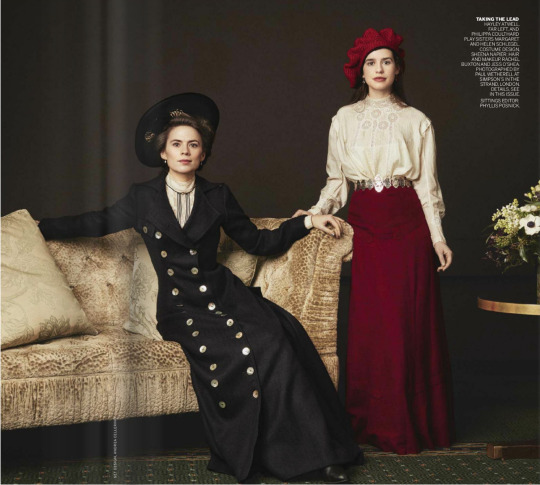
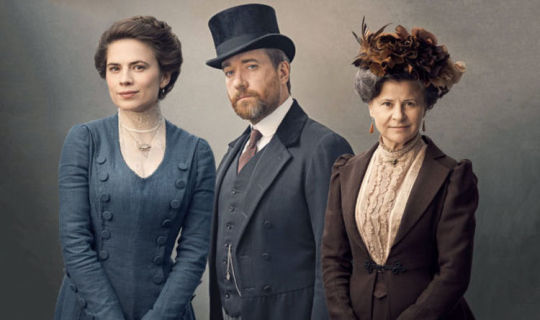
I found them quite colorful and beautiful without being too stylized or glamourous. Considering the characters viewers are dealing with, that seemed sufficient to me. I also enjoyed Wojciech Szepel's beautiful photography, especially in locations in London, Dorset and Buckinghamshire. But what really blew my mind were Luke Hull's production designs. I thought he did a superb job in re-creating Edwardian England, especially those scenes shot and set in London. While watching the miniseries, I felt as if someone had dropped me squarely back into London circa 1905-1906.
"HOWARDS END" managed to score a good number of award nominations, but I noticed that most of them came from lesser award organizations. It did win the BAFTA Award for Best Miniseries, but that was about it. No other nominations from BAFTA, no nominations from the Golden Globes or the Emmys. And all I can say is . . . "what the hell?" "HOWARDS END" proved to be one of the best television limited series I have seen in years. It became a critical darling from the media. Yet, it did not earn or win any major nominations, aside from the BAFTA Best Miniseries award? Were people so busy comparing it to the 1992 Merchant-Ivory film that they were blinded by its own merits? Hell, I believe it is just as good as the 90s film in its own way. I thought Hettie MacDonald, screenwriter Kenneth Lonergan had created an exceptionally first-rate miniseries that featured superb performances from a cast led by Hayley Atwell, Matthew MacFadyen and Philippa Coulthard. Perhaps one day, many other than the media, will appreciate it on its own merits.
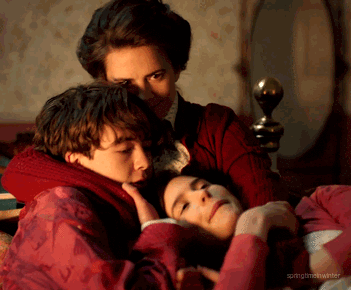
#e.m. forster#howards end#howards end 2017#hettie macdonald#kenneth lonergan#schlegel family#wilcox family#bast family#hayley atwell#matthew macfadyen#philippa coulthard#joseph quinn#tracey ullman#rosalind eleazar#alex lawther#joe bannister#bessie carter#jonah hauer king#julia ormond#bafta award#yolanda kettle#bbc costume drama#costume drama#period piece#period drama
16 notes
·
View notes
Text
[Goethe and Schiller are hiding Kleist in their bathroom to protect him from Schlegel for whatever reason]
Karl: Daddies, there's a man in the bathroom.
Schlegel: What?
Goethe: That? That's a Wiggles song.
Schiller: That's a Wiggles song.
Goethe, singing: 🎶Daddy, there's a man in the bathroom.🎶
Goethe and Schiller, both singing: 🎶There's a man in the bathroom...🎶
Schiller: 🎶He's in the shower...🎶
#source: modern family#johann wolfgang von goethe#friedrich von schiller#schoethe#friedrich schlegel#incorrect german romanticism quotes
4 notes
·
View notes
Note
thank you for the wonderful bird candy, hideo 🐔🐧🐦🐤💚
どういたしまして my little plum blossom.
here is more for your sweet tooth.

Schlegel’s Asity (Philepitta schlegeli), family Philepittidae, order Passeriformes, endemic to Madagascar
photograph by Shailesh Pinto
328 notes
·
View notes
Quote
Wherever artists make up a family there we have the original convocations of humanity.
Friedrich Schlegel, Ideas
62 notes
·
View notes
Text
Class action lawsuits against six of Ontario's largest for-profit long-term care (LTC) home providers, claiming gross negligence that led to illnesses and deaths during the COVID-19 pandemic, have been allowed to proceed.
In a ruling last week, the Ontario Superior Court of Justice certified class action suits against Sienna, Revera, Schlegel, Responsive, Extendicare and Chartwell.
The separate class actions were filed on behalf of thousands of clients, family members and visitors, who allege the companies were unprepared to provide care during the pandemic and failed to protect the health of residents and visitors.
Full article
Tagging: @politicsofcanada
#cdnpoli#canada#canadian politics#canadian news#canadian#ontario#long term care#long term care facilities#long term care homes#privatization#class action lawsuits#class actions#coronavirus#COVID-19#sienna#revera#schlegel#responsive#extendicare#chartwell
59 notes
·
View notes
Text
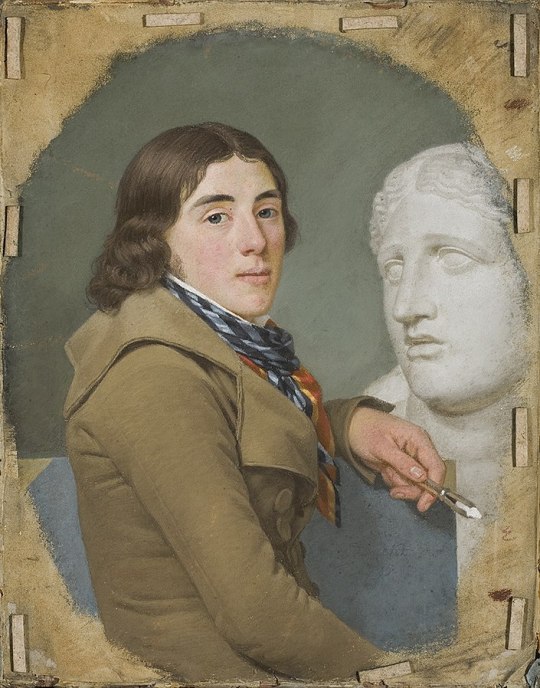
Joseph Octave van der Donckt - Portrait of Albert Gregorius - 1795
Franciscus Joseph Octave van der Donckt (30 June 1757, Aalst - 16 August 1813, Bruges) was a Flemish portrait painter, miniaturist and pastellist. He is also referred to as Jozef Angelus Van der Donckt, as well as several other variations, too numerous to list.
Albert Jacob Frans Gregorius, or Albert Jacques François Grégorius (26 October 1774, Bruges - 25 February 1853, Bruges) was a Flemish-Belgian portrait painter and Director of the art academy in Bruges.
He was born into a poor, laboring family. His drawing abilities were observed by François van der Donckt, a local portrait painter who took him in, gave him his first lessons and helped him enroll at the art academy. Gregorius was there from 1791 to 1793 and won several awards.
In 1801, he went to Paris, where he was apprenticed to Joseph-Benoît Suvée, who was also from Bruges. Not long after, Suvée went to Rome to become Director of the French Academy, but Gregorius was able to find a position in the studios of Jacques-Louis David. In 1805, he was back in Bruges, making preparations to enter the Prix de Rome, but fell ill and was unable to participate.
After his recovery, he returned to Paris and remained until 1835. He soon established a reputation as a portrait painter and formed an association with other expatriate Flemish artists ("De Club van de Belgen"). After exhibiting in the Ghent Salon, he entered the Paris Salon in 1812 and would continue to display there annually until his departure. In addition to the usual French nobility, he is also known for his portrait of August Wilhelm Schlegel, which is now on display at Coppet Castle.
At the age of 61, he received an appointment as Director of "De Vrije Academie" (now "De Stedelijke Academie") in Bruges. He served until 1852, when he was forced to resign after clashes with colleagues, students and city officials over his conservative approach to art. His best-known student was Ford Madox Brown.
Curiously, on his death certificate he was described as a "widower", but his wife's name was unknown. It has been speculated that he was briefly married during his long stay in France and had no close relatives he cared to notify.
#Franciscus Joseph Octave van der Donckt#18th#bruges#portrait#Albert Gregorius#belgium#19th#paris#history
36 notes
·
View notes
Text

(A Little Life, Part 5, Chapter 2, pg. 602 - Hanya Yanagihara)
Why Schumann?
After some digging on the internet, I have learnt that it is not a coincidence that Hanya chose Schumann's Fantasie in C for this moment, and I believe Jude was playing the first movement in this part. Fantasie in C was composed in 1836 as only a piece called Ruines, expressing his distress at being distant from his beloved Clara, and then it became the first movement of Fantasie. The first movement of the work contains a musical quote from Beethoven's song cycle, An die ferne Geliebte (To the distant beloved) as a secret love message:
Take, then, these songs, beloved, which I have sung for you
However, this musical quotation was not acknowledged by Schumann. The movement also was prefaced with a quote from Friedrich Schlegel:
Durch alle Töne tönet / Im bunten Erdentraum / Ein leiser Ton gezogen / Für den, der heimlich lauschet.
Resounding through all the notes / In the earth's colorful dream / There sounds a faint long-drawn note / For the one who listens in secret
During this period, Robert Schumann and Clara Wieck was in separation because Clara's father disapproved of their relationship. Those quotations truly reflected his yearning to Clara, his passionate love to her, and it is more beautiful to learn that they communicated mostly through music and journals because Clara did not communicate verbally well. In a letter sent to Clara in 1838, he wrote:
The first movement may well be the most passionate I have ever composed - a deep lament for you.
They got married in 1840 but their marriage was not through an easy path because Schumann was not mentally well.
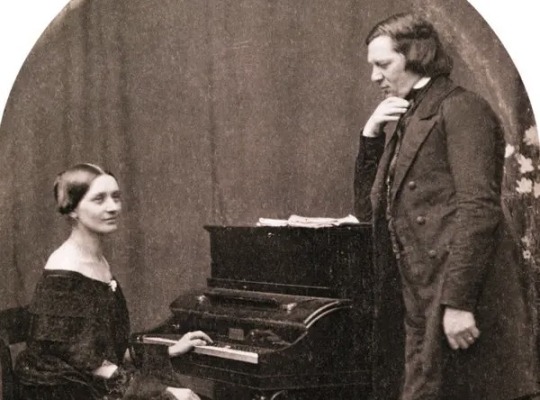
(Clara and Robert Schumann around 1850. Corbis, via Getty Images)
In August of 1844, he suffered a severe mental and physical breakdown. He was in pains, he trembled, wept, could not sleep and even became so sick that he could not walk across the room by himself. By February of 1854, Schumann insisted to be committed, as he felt that he had lost control of his mind. On 27th February, he attempted suicide by throwing himself from a bridge into the Rhine River. He was rescued and taken to the hospital later and remained there until his death on 29th July, 1856. During his confinement, Clara was not allowed to visit him (they communicated thanks to Johannes Brahms, a very good friend of the family, especially Clara) and only able to meet him 2 days before his death.
In Clara's journal on 26th February, 1854 (1 days before his attempt suicide), she wrote:
He was so melancholy that I cannot possibly describe it. When I merely touched him, he said, "Ah Clara, I am not worthy of your love." He said that, he to whom I had always looked up with the greatest, deepest reverence.
The resemblance of Jude and Schumann's mental illness may be one of the reason that Hanya chose this piece for Jude to play after he and Willem got home after their big fight. Jude plays the song with the intention to ease his sadness and fear. In this moment, he feels that this might be the end of their relationship, he is afraid that Willem would leave him because now he finally sees how sick he is. The piece Fantasie symbolizes a yearning for love but in this moment, it is a calling for Willem to stay, to understand, to forgive his action, his sickness.
Sources:
Acreman, Thomas. (2017). The Love Story of Clara Schumann. Retrieved from http://www.classichistory.net/archives/clara-schumann
Wilson, Frances. (2019). A Love Letter in Music Schumann's Fantasie in C, Op. 17. Retrieved from https://interlude.hk/love-letter-music-schumanns-fantasie-c-op-17/
#a little life#hanya yanagihara#jude st. francis#willem ragnarsson#robert schumann#clara schumann#literature#classical music#schumann#thank you to people who reblogged this post i don't know how to comment on your reblog post#my a little life revisit diary
83 notes
·
View notes
Text
It was lovely to finally see Stephen Soucy’s Merchant Ivory documentary on the big screen at BFI Flare 2024 this afternoon, and the stars/crew/Merchant Ivory family were out in force. Guess who:
(1) looked startlingly younger in person that they do in the documentary (or they have a lookalike)
(2) was spotted popping in and out of the screening, and in and out of the hospitality room for beers
Also spotted: costume-design legend Jenny Beavan, Adrian Ross Magenty (Tibby Schlegel/deleted Dickie Barry) and Rupert sitting next to (looked like) A Room With A View’s cinematographer Tony Pierce-Roberts.
#merchant ivory#stephen soucy#james ivory#maurice 1987#rupert graves#jenny beavan#adrian ross magenty#bfi flare#bfi flare 2024#queer cinema#queer filmmakers
25 notes
·
View notes
Text
The Many Lives of Arthur Llewellyn
You know how sometimes you can look at a person and just know, instinctively, that they came from some cosmic elsewhere? Their face, their clothes, their speech—it all belongs somewhere specific, somewhere other than where they are. Every now and then you come across a time-traveler, an astronaut, a lovelorn Victorian in the body of a twentysomething city-dweller. Your Arthur is one such curiosity, you think. A cursory glance would place him on a street-corner in Greenwich Village, or smoking a cigarette beneath a gas lamp in San Francisco. He’s got that foggy beatnik thing going for him. That he exists among the long-haired, strong-armed Seattleites of 1995 must mean that someone out there in the galactic mist is looking out for you; by all accounts, you should never have met this walking anachronism.
But you did, and against all odds he’s currently sitting at your dining room table and using a set of nail clippers to mend the clasp of a necklace his mother insisted was too broken to continue wearing. He suggested she take it to a jeweler, and her subsequent “Why bother” had riled him up to the point that he insisted on fixing the damned thing himself because, in his words, “Why bother? Why bother buying anything if you’re not going to take care of it? You just throw your clothes away when they get holes?”
“I can feel you staring,” he says now, without looking up. Guilty as charged, you hide your smile behind the copy of Howards End that you’re pretending to read. Maybe he’s a weary ship’s captain, taking meticulous care of what few possessions he has that remind him of his faraway home. Maybe somewhere he’s stowed a pair of red boots, made from fine Spanish leather, for safekeeping until he returns to his aching sweetheart on the shore. Maybe you have an overactive imagination.
Aunt Juley is sick, and Helen won’t come home to the grieving Schlegel family, and won’t she reconsider ending her engagement to Paul? Who cares, when Arthur Llewellyn is carefully slinking toward triumph in the battle against his mother’s gold chain? You turn a page without reading it, your eyes still trained on your boyfriend’s long fingers until, with a soft and disbelieving gasp, he holds the chain up for you to see. The clasp looks brand-new, and even if he did only fix it to spite his mother, your heart flutters with pride—he’s a sensitive one, whether he likes it or not. You happen to know that the necklace was given to Mrs. Llewellyn by Arthur’s father: an emerald pendant, her birthstone. The Llewellyns are not sentimental people (with the exception of their son, that is); according to Arthur, he’s had to practically beg them not to donate his great grandmother’s china sets on more than one occasion. As a consequence, his own apartment is full of antiques and souvenirs he couldn’t bear to see thrown away.
You move closer to him under the pretense of inspecting his work, rising from your chair to stand beside him.
“Very nice,” you say, “are you sure you want to keep going with this teaching thing? I think you’ve got a real future in jewelry repair.”
Arthur tilts his head back to look at you, placing the necklace down on the table. You run a hand through his hair, letting your palm come down to cup his face. He leans into you like a man deprived. You sometimes wonder if his immediate family’s stoicism did a little damage to the part of him that now seems to need your touch like oxygen. “Funny,” he says, “I was thinking the same thing. You think they’ve got good benefits?”
You smile, running your thumb across his sharp cheekbone. He’s been frustrated, you know, in the days leading up to the start of the school year. The school’s curriculum, which he says is “unbearably boring,” leaves little room for creativity, but he’s trying his best. He’s starting his students with The Hitchhiker’s Guide to the Galaxy this year.
Arthur is flexing his hand repeatedly, probably working out a cramp from his delicate operation with the nail clippers. You perch on the edge of the table, sliding back to a full sit, before taking that hand in both of your own. Slowly, gently, you massage the tension out of his fingers while he looks on in awe. “You want to get out of here?” You ask, “It’s a gorgeous day. Take a walk with me?” He nods, allowing you to lead him out of your apartment and into the midday air, perfumed with lilac and salt.
Your building is on one of those dreadful Seattle hills, the ones you don’t realize are as steep as they are until one day you put on your favorite sundress and realize your calves look absolutely stunning. You lead Arthur up the block, ignoring his halfhearted protests until you’ve made it to the top of the hill. There, he lets his hand go to the small of your back, keeping it there as you continue to walk. After a moment’s silence, he leans over to kiss your temple. “I love you,” he says. Casually, like he has so many times. Like it’s a way to fill the silence instead of a world-bending declaration, like he couldn’t bring you to your knees at any moment with it.
“I love you too,” you say, knowing it carries the same weight for him.
“Can I be so corny for a minute?” He asks, his hand moving gently up and down your back as you walk.
“You can be as corny as you want,” you reply. Never in your life have you seen this kind of earnestness in a man. Never in your life have you even wanted it—never, until you had it.
Arthur takes a deep breath. “I’m really happy,” he says, his voice hoarse, “I’m so fucking happy.”
“Sounds like it,” you tease, nudging him.
“I am,” he finally smiles, “I am. It’s scary though, you know? I’d kind of reached a point where I thought happy was a myth. Or, no—not a myth, I just thought it was something for other people, right? Like, when they’d talk about how happy they were, I thought either that they were exaggerating or that there was something wrong with me, because I didn’t know what they were talking about—does that make sense?”
You stop walking for a moment, turning to Arthur. “You’ve thought about this a lot, huh?”
“Yeah,” he says. You respect his lack of sheepishness. “I’ve had to, you know? It’s like I’m experiencing this whole new facet of human life I didn’t know existed. Like maybe I thought I knew, and you’ve just turned everything upside down.”
You’ve got no choice but to kiss him. There, on the street corner, where it’s nothing short of edenic, you wrap your arms around his shoulders and press your lips to his, hard and sweet. He gasps against you in that way that you love, that way that lets you know you’ve taken him by surprise once again. His shock is only momentary, however, and within seconds you’re wrapped so tightly in his arms that he’s all you can feel, all around you.
“Arthur,” you say, coming down off your toes and letting your hands drag down his chest, “if this is all it takes to make you happy, then neither of us has anything to worry about.”
The boy is grinning in earnest now, eyes fixed on your face. “Oh, fuck,” he says, shattering the illusion that he is anything but a west coast twentysomething, “Jesus, honey…”
He’s running a hand over his face now, like he’s trying in vain to wipe the smile from his features. “What?” You ask, grinning something awful yourself.
“I just saw the future, that’s what,” he says, sweeping you once again into his arms, “I saw my entire life in your face, it’s all you. All you, forever.”
You can’t help but to laugh, a stunned expulsion of joy you weren’t expecting to feel. “Oh god, you’re stuck with me then?”
“There was never anything else in the cards for me, to be fair,” he says, “and just to be clear, I wouldn’t have it any other way.”
Arthur’s a bit of a mystic about things like that—souls and stardust and past lives—it took you by surprise at first, but you’ve grown to realize it’s maybe the thing that makes the most sense about him. Of course your out-of-place, out-of-time alien creature of a boyfriend thinks—knows, if you ask him—that the two of you are cosmically entwined. And you, for your part, know that you would rather die than deny him these little fantasies. After all, it’s you who sees a thousand lives in his face, each more complex and profound than the last. Between Seattle and England and outer space and the Pacific ocean, you find yourself hoping against your own iron-clad logic that the two of you will find each other again after this life (and after, and after, and after).
#toady talkin#can y’all tell I have been absolutely devouring Kelly Link lately#i don’t know where the dialogue gene went#she’s gone she left the building#anyway i hope you enjoy sweet anon! and whoever else might have wanted more of arthur lmao#also btw if you wanted to listen to Liz Phair’s Perfect World while you read……I wouldn’t discourage that
12 notes
·
View notes
Text
Dances In The Moonlight (Falk Maria Schlegel x GN! Reader) - Part X
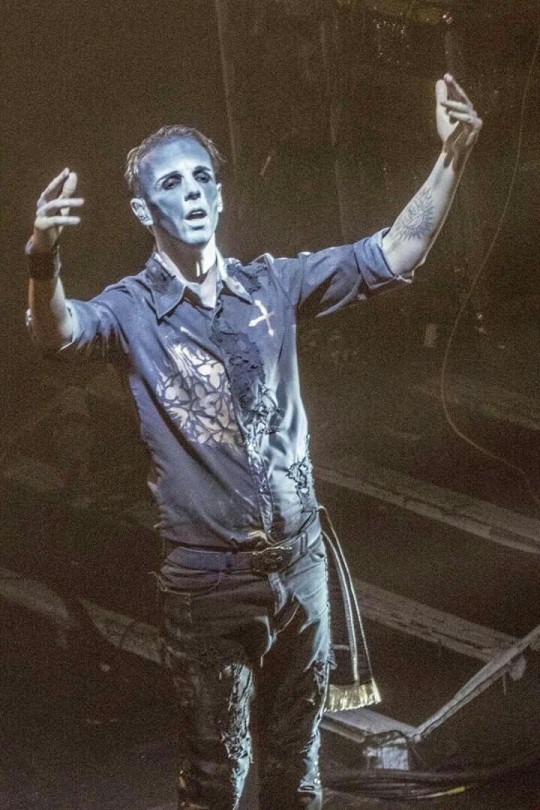
WARNINGS: Discussion of ritualistic practices, we celebrating the summer solstice in this one babyyy, Falk being sweet and cute per usual, let me know if I missed any, this took me a couple days to write so I can't remember all of it.
Also, I'm starting a tag list, if you would like to be notified when I post shoot me a message!
Part IX - Part XI
~~~~~~~~~~~~~~~~~~~~~~~~~~~~~~~~~~
You hesitantly followed Falk into the ritual room, the door letting out a haunting creek as it slowly closed behind you. "I thought you said I wasn't allowed in here?"
He chuckles, "well there isn't much of a secret to keep anymore, is there?" You return his playful grin, he did have a point. Your footsteps echoed in the empty room. "Besides, there's something I want to show you." His warm hands landed on your waist as he lifted you from the floor and into his seat around the table. He headed to a chest in the corner of the room, digging through the contents. You pushed all the way back, your feet now barely peeking out over the edge. Falk's gaze lands on you as you make yourself comfortable in his ceremonial chair, a chuckle escaping his lips as he approaches. "You look very cute up there, meine Maus." He stands before you, carefully unwrapping the crimson cloth he held in his hand. You gasped at the relic, a gorgeous ceremonial headpiece that was adorned with the finest jewels and perfectly bleached bones. "Roel found this stored away in the archives the other day, it was my mother's."
"It's beautiful." You ducked your head down to get a closer look at it. You felt it would've been disrespectful to try and pick it up. "What was it for?"
"She wore this the day she married my father." He smiles fondly. "I'll have to dig up the pictures, I think you'll enjoy them."
"Where are your parents now?" You approached the question carefully. You had never heard Falk talk about his family before, but you would be lying if you said you weren't curious.
"Retired peacefully in the mountains." He gives you a knowing smirk, he expected you to think something horrible had happened. "My father is somewhat of a recluse, as I'm sure you can imagine." You share a laugh. He carefully picks up the headpiece, setting it gently on your head. "I want you to hold onto this."
"I'm flattered, really, but why?" He takes your hands in his.
"It's a promise. A promise to keep you safe, to love you to the best of my ability, to never let anything hurt you." He brings your knuckles to his lips. "You're very special to me, I don't want you to ever forget that." He caresses your cheek, looking deeply into your eyes. Your lip quivered as you felt tears prick against your lashes. You saw the briefest flash of panic in his eyes as he thought he did something to upset you.
"Falk… I love you." Tears slid down your cheeks, you rested your forehead against his, the cool metal encasing one of the many crystals of the headpiece digging into your skin slightly.
"I love you too, Schatz." He cups your cheeks in his hands, delicately wiping away your tears." You both jumped at the sound of the door opening.
"There you are!" Attila lets out an exasperated sigh. "We're going to be late, you need to get ready." He noticed you had been crying. "(Y/N), what did he do? I'll kill him, I'll make it look like an accident." You can't help but laugh.
"Happy tears, I'm fine Father Attila, don't worry." Falk helps you down from your seat, carefully removing and rewrapping the headpiece.
"(Y/N), just call me Attila. You're Falk's seelenbindung, I think we can be a little more casual." He laughs. You muttered the word to yourself, Falk chuckling at your confusion.
"I'll explain later, come on, you're coming too." You pushed your fingers through his as he hurried through the halls. "I'm sorry this is happening on such short notice, I forgot we had to go to this today."
"Where are we going?" You watched as he digs through his closet in a panic. You hear him make a triumphant sound as he produces two ceremonial robes from his wardrobe.
"To celebrate the summer solstice. Here, put this on." You held up your arms as he dropped the robe over your head, the fabric pooling at your feet. You watched as Falk put on his own ceremonial robe, one that looked incredibly similar to the one he gave you, just missing a few embellishments. "Remind me, I have to take you for a consultation for your own robe." You rushed out the door behind him, he explained as the two of you headed down to his car. "You being my Seelenbindung means it's encouraged that you attend events with me. You get your own ceremonial robe, which you will have a hand in personalizing however you like."
"Question." You interrupt his rambling.
"Answer." He responds quickly.
"What does Zeelin-" You don't even attempt to finish the word, knowing you were just going to butcher it
"Seelenbindung?" You nod. "It means soul tie, it's kind of our version of a soulmate." You let out a surprised yelp as his car jerked forward.
"I take it this is an older robe." You had so many questions. What events would you be attending with him? Was there any type of initiation ceremony you had to go through? How should you design your robe?
"Yes it is." He chuckles. You ran your fingers over the intricate embroidery, soft golden thread against a stark black background. The robe he was currently wearing wasn't much different. If anything it was more ornate. Beading worked effortlessly into the stitches of the embroidery that were laid in a somehow even more complex pattern. His robe was also lined with a deep maroon silk that peeked out from his billowing sleeves as he moved. You jumped as a horn blared next to you, looking out the driver's side window you saw a car starting to pass you. You bursted out laughing at the sight of Matthew's face pressed against the glass. Falk shakes his head with a smirk. "Also, I know having to rush was probably stressful, but you'll have fun. We just need to get there before sundown." You pulled into a dirt lot that was packed with cars, the rest of the members of the high clergy waiting on your arrival. You walked down a long winding footpath through the woods until you came across a clearing. Much like the dinner you had intended in the past, the sight before you was nothing like you expected it to be. A small group of creatures you didn't recognize were working on setting up for a bonfire, the longer you looked around you realized you being fully human you were more than likely the minority in this situation.
"You look shocked." You jump at Charles' voice being right next to your ear. He chuckles at your amazed expression. "This is one of the few places they can safely remove any glamor magic, so don't be scared by all the horns and sharp teeth." You nod, trying your hardest not to stare. You remained glued to Falk's side as he made his rounds through other attendees. You watch a man approach the two of you, adorned in papal robes and… skeleton paint? Falk's eyes light up at the sight of him, the two exchanging a hug.
"Eh, and who might this be? This must be your seelenbindung." He smiles warmly at you, shaking your hand.
"That they are, Papa, this is (Y/N). Schatz, this is Papa Emeritus IV, he's a very good friend of our church." He gives you a polite nod. "We heard you and your Prime Mover are expecting, congratulations!"
"Thank you, we're all very excited. You'll have to stop by sometime, take your amoré on a stroll through Primo's garden, sí?" Falk chuckles, nodding his head.
"I promise, we'll stop by soon. We've been a little preoccupied."
"Yes, of course, I'm sure that last super moon complicated things." Papa's eyes flash down to you for the briefest of moments, almost as if he wasn't sure he should be discussing this in front of you.
"It did, but it wasn't anything we couldn't handle." He wraps his arm around your shoulder. "If you'll excuse us." You politely make your way over to the rest of the high clergy, the celebration of the Summer Solstice starting anytime now. "He's the head of the Satanic Temple across town." You and Falk nestled down with the rest of the high clergy as you watched the sun set over the horizon. He reached out and took your hand, giving it a gentle squeeze. Cheers rang out through the crowd as the last dying light disappeared. Falk pulled up the hood of your ceremonial robe, quietly instructing you to kneel in the dirt just as he was. You copy his instructions carefully, taking the chance to glance around only to see the rest of the crowd around you all doing the same thing. Hushed murmurs of Latin phrases you didn't recognize danced in the air, a noticeably magical shift in energy with every syllable that was uttered. The bonfire roared to life as the collective prayer ceased.
You were amazed at the sight before you. Despite everyone's different backgrounds, faiths, species, it was unmistakable. This was one big family. Outcasts that had all found each other and made something wonderful out of it. "Falk, this is incredible." You whisper to him.
"I told you you'd have fun." He playfully nudges your shoulder. You decided to sit and watch the festivities around you for a while. Conversations buzzed in every corner of the clearing, ceremonial robes discarded, drinks were shared, the smell of the food that was being prepared made your mouth water. "You know, you can get up and join them." He gives you an encouraging smile, nodding in the direction of the crowd around the bonfire.
"Oh, I don't really feel like it's my place to join." You say nervously. He takes your hand, bringing your knuckles to his lips.
"Schatz, it's alright, everyone here is a friend. I'm sure they'll welcome you in with open arms." You nod, letting him drag you into the festivities. You watched from the sidelines at first. Beautiful humans and creatures alike chanting and dancing around the flame.
"What are they saying?" You ask Falk quietly.
"They're asking for good harvests and fortune, the dance is kind of like an offering." You nod, watching the figures swirl in the hot orange glow. "Come on." He tugs you in the direction of the bonfire, never letting go of your hand as he prompts you to dance along with him. In no time you found yourself laughing, moving your body in whatever way felt natural as you circled the inferno. Once you had sufficiently worn yourself out the two of you collapsed side by side in the soft grass on the outskirt of the clearing. "It's nice to see you enjoying yourself." His warm hand caresses your cheek. You leaned over, lips pressed firmly to his. He lets out a pleased hum, arm circling around your waist as you let your head fall into his chest. A small smile formed on your lips. You listened to his heartbeat, fingers ghosting over the lines of his tattoos. In that moment with him you truly felt at home.
~~~~~~~~~~~~~~~~~~~~~~~~~~~~~~~~~~
Tag List: @ramblingoak @the-hole-in-terzos-shoe @jumpcauseimfroggy @mustluvecho @rabidghoul @kissingghouls @copiousloverofcopia @moss-the-moth @littlegirlsdontplaynice @vampghoulette @angellayercake (I think that everyone if I missed you let me know)
#if you like ghost youll probably like this#falk fan fiction#falk maria schlegel powerwolf#falk maria schlegel x reader#falk x reader#falk powerwolf#falk maria schlegel#powerwolf x reader#powerwolf band#powerwolf#x reader#fan fic writing#fan fiction#fanfic#my writing
30 notes
·
View notes
Text
Howards End: Tibby Schlegel [INTP 5w4]
MBTI Type: INTP
Tibby is something of a caricature, in that he is the intellectual in the family, more focused on his abstract hobbies, reading his books, quoting his poets, or listening to his favorite music, than he is interested in the mundane reality of the outside world and its chores – he leaves Margaret to do almost everything after they’re told they must move. She has to find a new…
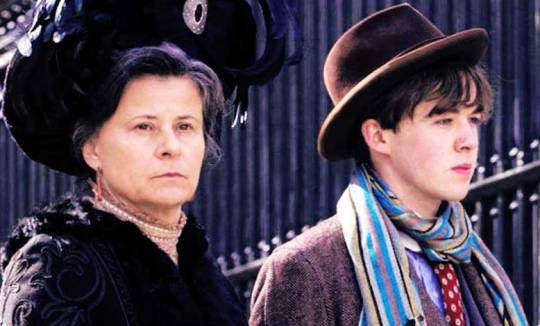
View On WordPress
6 notes
·
View notes
Text
Political romanticism has been accused of inventing race-thinking, as it has been and could be accused of inventing every other possible irresponsible opinion. Adam Mueller and Friedrich Schlegel are symptomatic in the highest degree of a general playfulness of modem thought in which almost any opinion can gain ground temporarily. No real thing, no historical event, no political idea was safe from the all-embracing and all-destroying mania by which these first literati could always find new and original opportunities for new and fascinating opinions. "The world must be romanticized," as Novalis put it, wanting "to bestow a high sense upon the common, a mysterious appearance upon the ordinary, the dignity of the unknown upon the well-known." One of these romanticized objects was the people, an object that could be changed at a moment's notice into the state, or the family, or nobility, or anything else that either — in the earlier days — happened to cross the minds of one of these intellectuals or — later when, growing older, they had learned the reality of daily bread — happened to be asked for by some paying patron. Therefore it is almost impossible to study the development of any of the free competing opinions of which the nineteenth century is so amazingly full, without coming across romanticism in its German form.
What these first modern intellectuals actually prepared was not so much the development of any single opinion but the general mentality of modern German scholars; these latter have proved more than once that hardly an ideology can be found to which they would not willingly submit if the only reality — which even a romantic can hardly afford to overlook — is at stake, the reality of their position. For this peculiar behavior, romanticism provided the most excellent pretext in its unlimited idolization of the "personality" of the individual, whose very arbitrariness became the proof of genius. Whatever served the so-called productivity of the individual, namely, the entirely arbitrary game of his "ideas," could be made the center of a whole outlook on life and world.
— Hannah Arendt, The Origins of Totalitarianism
10 notes
·
View notes
Text
Novalis: I have edge.
Schlegel: You really don't. You are literally the most wide-eyed person I've ever seen. You have the face of a cartoon lamb.
#source: modern family#friedrich schlegel#friedrich von hardenberg#when i'm talking about novalis here i mean fritz von hardenberg; i never refer to myself in the third person#incorrect german romanticism quotes#fritz really does have the face of a cartoon lamb doesn't he?
3 notes
·
View notes
Text
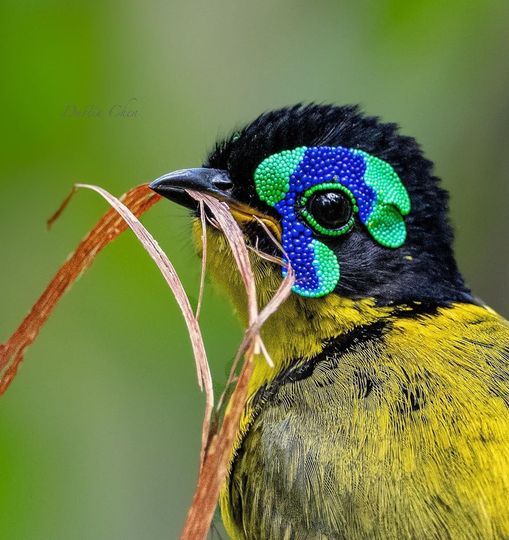
Schlegel's Asity (Philepitta schlegeli), family Philepittidae, endemic to Madagascar
photograph by @dustinchen0728
307 notes
·
View notes
Quote
I'm disappointed in not finding in Kant's family tree of basic concepts the category "almost," a category that has surely accomplished, and spoiled, as much in the world and in literature as any other. In the mind of natural skeptics it colors all other concepts and intuitions.
Friedrich Schlegel, Critical Fragments
81 notes
·
View notes
Text
October 28, 1809
Couche at 1. Rose at 7. Called on J. de C. at 10. Was received by Madame with very engaging frankness and ease. Passed an hour with the family. Got some books, and he sent his servant for others for me from the King's library. Young brother of Mr. J. de C. went to show me Puerari's; out; left card. Had scarcely got home, when Puerari called on me. We walked to see the library of Classenborg, about which I have a pretty story to tell you. This library is confined to natural history and botany, and is magnificent in those departments. It is in care of Professor Ramus, to whom I was there introduced. He tendered himself to go with me on Sunday to the Palace of Rosen, and to show me the collections of coins and medals, which is said to be splendid. I shall make some addition to Gampy's stock here. You can't think what trouble the little varlet has brought me into. Having on my arrival inquired where some coins and medals could be had, it was immediately noised about that I was a medal and coin hunter, and scientific, of course, in numismatique.¹ Puerari introduced me as such to Ramus, for which I could have boxed him. Dined to-day, for the first time, at the table d'hote,² and am so well pleased with the company that shall dine there henceforth when not engaged abroad. At 6 walked out to see the illuminations and fireworks at the palace of Fredericksberg, about 1 1/2 miles, on occasion of the arrival of the King and Queen. You must know that the Queen has been passing some months (ever since the death of the late King) with her father in Holstein, and has never yet been seen here as Queen, which is the cause of all this stir. And so it happened that we all, about 30,000 of us, came back as we went; the King and Queen had not arrived; there was neither illumination nor fireworks; we were all quite sad. The report is that the King cannot get across the Belt a cause du³ British fleet. Called on Schlegel this morning; out.
1 The science of coins and medals.
2 For table d'hôte. Literally, host's or guest's table. A complete meal regularly served in a public dining room.
3 Because of the.
3 notes
·
View notes